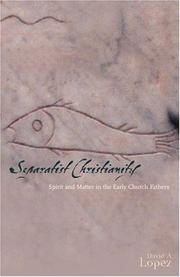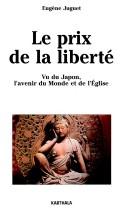| Listing 1 - 10 of 120 | << page >> |
Sort by
|
Book
ISBN: 2728905312 9782728905317 Year: 1992 Publisher: Paris Mame
Abstract | Keywords | Export | Availability | Bookmark
 Loading...
Loading...Choose an application
- Reference Manager
- EndNote
- RefWorks (Direct export to RefWorks)
Christian life --- Church and the world --- Christianity and the world --- Church and society --- Society and the church --- World and the church --- Worldliness (Theology) --- Mission of the church --- Christianity and international relations --- Christians --- Discipleship --- Religious life --- Theology, Practical --- Christianity
Book
ISBN: 9782830914566 2830914562 Year: 2012 Publisher: Genève Labor et Fides
Abstract | Keywords | Export | Availability | Bookmark
 Loading...
Loading...Choose an application
- Reference Manager
- EndNote
- RefWorks (Direct export to RefWorks)
Book
ISBN: 3869458429 9783869458427 Year: 2015 Publisher: Nordhausen Traugott Bautz
Abstract | Keywords | Export | Availability | Bookmark
 Loading...
Loading...Choose an application
- Reference Manager
- EndNote
- RefWorks (Direct export to RefWorks)
Church history. --- Church and the world. --- Christianity and the world --- Church and society --- Society and the church --- World and the church --- Worldliness (Theology) --- Mission of the church --- Christianity and international relations --- Christianity --- Ecclesiastical history --- History, Church --- History, Ecclesiastical --- History
Book
ISBN: 9055737364 Year: 2006 Publisher: Budel Damon
Abstract | Keywords | Export | Availability | Bookmark
 Loading...
Loading...Choose an application
- Reference Manager
- EndNote
- RefWorks (Direct export to RefWorks)
Ecclesiology --- Church and the world --- #gsdb10 --- Christianity and the world --- Church and society --- Society and the church --- World and the church --- Worldliness (Theology) --- Mission of the church --- Christianity and international relations
Book
ISBN: 2718902965 9782718902968 Year: 1986 Volume: vol *21 Publisher: Paris [Tournai] Desclée
Abstract | Keywords | Export | Availability | Bookmark
 Loading...
Loading...Choose an application
- Reference Manager
- EndNote
- RefWorks (Direct export to RefWorks)
Ecclesiology --- Christendom --- Christianisme --- Pastoraal --- Pastorale --- Church and the world --- Vatican Council --- #SBIB:321H410 --- Christianity and the world --- Church and society --- Society and the church --- World and the church --- Worldliness (Theology) --- Mission of the church --- Christianity and international relations --- Westerse politieke en sociale theorieën vanaf de 19e eeuw: christelijke gedachte: officiële kerkelijke documenten en commentaren (o.a. encyclieken) --- Vatican Council, 2nd, 1962-1965

Abstract | Keywords | Export | Availability | Bookmark
 Loading...
Loading...Choose an application
- Reference Manager
- EndNote
- RefWorks (Direct export to RefWorks)
Christians living in the Roman empire during the first four centuries after Christ struggled with the extent to which they should recognize and accept imperial authority. In the fifth century A.D., Augustine of Hippo definitively enabled Christians to support Roman power directly by showing how the purpose of the state could be consistent with the purpose of Christianity. Christians could and should submit to the rule of Roman law and live within a society characterized by a plurality of religions. But as David Lopez demonstrates in 'Separatist Christianity', the four centuries before Augustine witnessed a very different and far less nuanced doctrine. Through a close reading of canonical writings from the second and third centuries, he finds a Christianity that advocated a complete separation from the material and pagan Roman world. Incited by state persecution and cognizant of the fragility of their communities, church leaders and prominent Christian thinkers exhorted their followers to reject any accommodation with the Roman empire. To recognize imperial authority, they contended, would be to apostatize from the truth of Christianity. Examining how ideas of martyrdom, apocalypse, and separation from the social and political world of Rome developed between the destruction of the Temple in 70 and Constantine's conversion in 312, Lopez finds a coherent and consistent anti-Roman sentiment in early Christianity. This radical agenda appears not only in the works by and about martyrs but also in the exegetical, disciplinary, and apologetic texts. By establishing the coherence and ubiquity of this separatist philosophy, Lopez offers a fresh new interpretation of the history of the early church.
27 "00/03" --- Kerkgeschiedenis--27 "00/03" --- Church and the world --- Separation from sin --- History of doctrines --- Christianity --- Primitive and early church, ca. 30-600 A.D. --- Christianity and the world --- Church and society --- Society and the church --- World and the church --- Worldliness (Theology) --- Holiness --- Sanctification --- Sin --- Mission of the church --- Christianity and international relations
Book
ISBN: 9782738118783 273811878X Year: 2007 Publisher: Paris Jacob
Abstract | Keywords | Export | Availability | Bookmark
 Loading...
Loading...Choose an application
- Reference Manager
- EndNote
- RefWorks (Direct export to RefWorks)
24 août 410 : la ville de Rome est mise à sac par Alaric 1er, roi des Wisigoths. 11 septembre 2001 : les Twin Towers s'écroulent, frappées par deux avions détournés par des terroristes. Dans le premier cas, la civilisation de l'Antiquité achève de s'écrouler ; dans le second, c'est la suprématie de l'Occident qui vacille. Entre ces deux dates, Maurice Sachot explore ce qui fait le fond même de la " civilisation " occidentale. Pour lui, même la sécularisation et la laïcisation qui semblent caractériser l'emprise que l'Occident a acquise sur le monde se définissent par référence au christianisme. C'est donc l'histoire de cette christianisation du monde qu'il raconte ici, privilégiant l'époque où tout s'est constitué, au basculement de l'Antiquité. Comment le christianisme s'est-il constitué et comment, ainsi, a-t-il transformé le monde ? Quels sont, par-delà les pays, les communautés, les époques, les traits qui ont fait la civilisation dite occidentale ? Venue de l'histoire des religions, une étonnante synthèse pour éclairer les débats d'aujourd'hu
Christian civilization --- Civilisation chrétienne --- History --- Histoire --- Church history --- Church and the world --- 27 "00/04" --- Kerkgeschiedenis--?"00/04" --- Civilisation chrétienne --- Christianity --- Ecclesiastical history --- History, Church --- History, Ecclesiastical --- Christianity and the world --- Church and society --- Society and the church --- World and the church --- Worldliness (Theology) --- History. --- Mission of the church --- Christianity and international relations
Book
ISBN: 3451229684 9783451229688 Year: 1993 Publisher: Freiburg im Breisgau Herder
Abstract | Keywords | Export | Availability | Bookmark
 Loading...
Loading...Choose an application
- Reference Manager
- EndNote
- RefWorks (Direct export to RefWorks)
Church. --- Faith. --- Church and the world. --- 268 --- Catechese. Godsdienstonderwijs --- Church --- Church and the world --- Faith --- Religious belief --- Theological belief --- Belief and doubt --- Religion --- Salvation --- Theological virtues --- Trust in God --- Christianity and the world --- Church and society --- Society and the church --- World and the church --- Worldliness (Theology) --- Mission of the church --- Christianity and international relations --- Ecclesiastical theology --- Ecclesiology --- Theology, Ecclesiastical --- People of God --- Theology

ISBN: 2865373630 9782865373635 Year: 1992 Publisher: Paris Éditions KARTHALA
Abstract | Keywords | Export | Availability | Bookmark
 Loading...
Loading...Choose an application
- Reference Manager
- EndNote
- RefWorks (Direct export to RefWorks)
Church and the world --- Theology --- Japan --- Social conditions --- Liberty --- Christianity and the world --- Church and society --- Society and the church --- World and the church --- Worldliness (Theology) --- Christian theology --- Theology, Christian --- Civil liberty --- Emancipation --- Freedom --- Liberation --- Personal liberty --- Social conditions. --- Mission of the church --- Christianity and international relations --- Christianity --- Religion --- Democracy --- Natural law --- Political science --- Equality --- Libertarianism --- Social control --- Japan - Social conditions
Book
ISBN: 9782204105828 2204105821 Year: 2015 Publisher: Paris Cerf
Abstract | Keywords | Export | Availability | Bookmark
 Loading...
Loading...Choose an application
- Reference Manager
- EndNote
- RefWorks (Direct export to RefWorks)
Dieu est Dieu. On peut et on doit le dire aujourd’hui, comme au temps de Maurice Clavel. Car la sécularisation n’exclut pas un discours sur Dieu mais il faut trouver une humanité commune pour l’y enraciner. Le christianisme de demain ne pourra pas se fonder seulement sur des ruptures. Il doit aussi devenir un lieu d’échanges à travers lesquels lui-même acceptera de se laisser transformer. Forts de cette conviction, et en s’appuyant sur la nouveauté du pape François, un évêque académicien, Monseigneur Claude Dagens, et deux éminents philosophes chrétiens, le moraliste Guy Coq et le phénoménologue Emmanuel Falque, s’associent dans ce livre pour ne pas, ou ne plus, désespérer ni de ce monde en perpétuel mouvement, ni de Dieu présent à ce monde.
Theological anthropology --- God (Christianity) --- Revelation. --- Church and the world. --- 239*01 --- Christianity and the world --- Church and society --- Society and the church --- World and the church --- Worldliness (Theology) --- Mission of the church --- Christianity and international relations --- God --- Inspiration --- Supernatural --- Christianity --- Trinity --- Man (Christian theology) --- Christianity. --- Toekomst van het christendom --- Revelation --- 239*01 Toekomst van het christendom --- Church and the world
| Listing 1 - 10 of 120 | << page >> |
Sort by
|

 Search
Search Feedback
Feedback About UniCat
About UniCat  Help
Help News
News